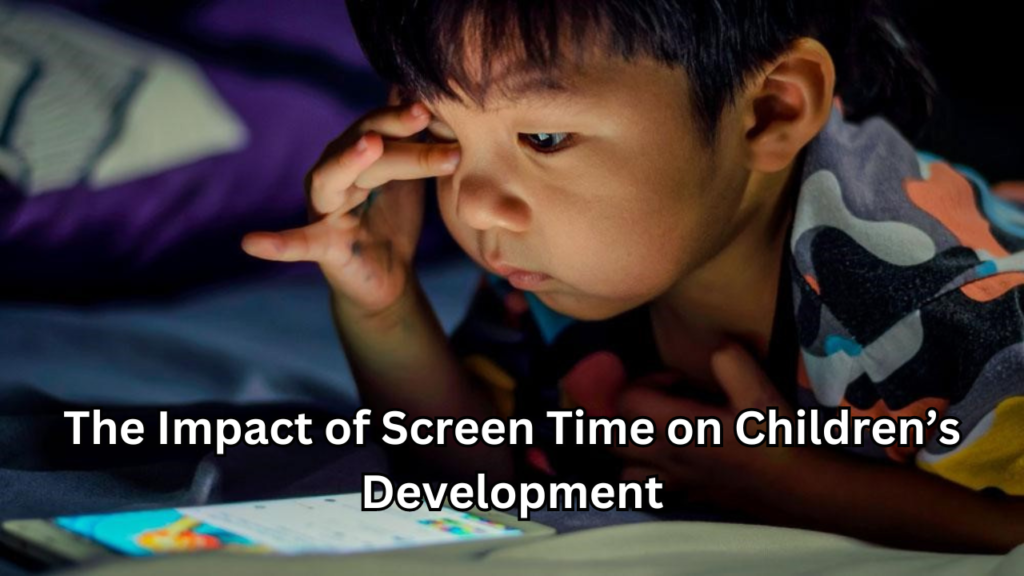
In the digital age, screens are ubiquitous, shaping the way children interact with the world around them. From smartphones to tablets and computers, these devices have become integral to modern life, but their impact on children’s development has become a growing concern. The debate about the effects of screen time on children’s physical, cognitive, and emotional development is ongoing, with research highlighting both potential benefits and significant drawbacks.
The Benefits of Screen Time
Before delving into the concerns, it’s important to recognize that screen time isn’t inherently harmful. In fact, when used appropriately, digital devices can offer valuable educational and developmental benefits. Educational apps and programs can enhance learning by providing interactive and engaging content that complements traditional teaching methods. For example, apps that teach coding or language skills can foster problem-solving abilities and literacy. Additionally, apps focused on nutrition can promote healthy eating habits by providing information and interactive tools for balanced diets and meal planning.
Additionally, screens can serve as tools for creativity. Digital art applications allow children to explore their artistic talents in new ways, while video-making tools can help them develop storytelling and multimedia skills. Screen time can also offer opportunities for social connection, especially for children who might struggle with face-to-face interactions. Online platforms can help them maintain relationships with friends and family members, bridging geographical gaps.
Cognitive Development and Screen Time
Despite these benefits, excessive screen time raises concerns about cognitive development. Research indicates that too much time spent on screens can negatively impact attention span and executive function. The constant stimulation from fast-paced video games and apps can contribute to shorter attention spans and reduced ability to focus on less engaging tasks. This is particularly concerning in a developmental stage where the ability to concentrate is crucial for academic success.
Furthermore, the multitasking often associated with screen use—switching between apps, notifications, and messages—can interfere with the brain’s ability to focus deeply on a single task. This cognitive overload can impede the development of critical thinking and problem-solving skills. Children may find it more challenging to engage in tasks that require sustained mental effort, potentially affecting their academic performance and overall cognitive growth.
Emotional and Social Development
The impact of screen time on emotional and social development is equally complex. On one hand, digital platforms can offer children support and community, helping them navigate social challenges and providing a space for self-expression. On the other hand, excessive screen time can complicate managing stress, leading to issues such as social isolation and reduced face-to-face interaction.
Social media, in particular, can have a profound effect on emotional well-being. The pressure to maintain a certain image or garner likes and approval can lead to anxiety and lower self-esteem, particularly in preteens and teenagers. Cyberbullying is another serious concern, as online harassment can have devastating effects on mental health.
Additionally, the reduced time spent in physical activities due to screen use can contribute to a sedentary lifestyle, which is associated with various health issues, including obesity and poor cardiovascular health. The lack of physical activity can also affect mood and emotional regulation, leading to increased feelings of lethargy and depression.
Managing Screen Time
Given these potential drawbacks, managing screen time is crucial for ensuring that children benefit from digital tools without suffering from negative consequences. The American Academy of Pediatrics (AAP) offers guidelines to help parents navigate screen use. For instance, they recommend limiting recreational screen time to no more than one to two hours per day for children aged 2 and older. It’s also important for parents to model healthy screen habits and create tech-free zones, such as during meals and before bedtime.
Encouraging a balance between screen time and other activities is essential. Parents should promote physical activity, creative play, and family interaction to ensure that screen time does not displace these important aspects of development. Additionally, selecting high-quality, age-appropriate content can help children reap the benefits of technology while minimizing potential harms.
The Role of Education and Policy
Educational institutions and policymakers also have a role in addressing the impact of screen time on children. Schools can integrate digital literacy programs to teach students about responsible screen use and online safety. They can also encourage practices that promote balanced screen habits and incorporate technology in ways that enhance, rather than replace, traditional learning methods.
Policymakers can support research into the effects of screen time on the immune system and develop guidelines that address the evolving nature of technology. Ensuring that families have access to resources and support for managing screen time can help mitigate the risks associated with excessive use.
Conclusion
The impact of screen time on children’s development is multifaceted, encompassing both potential benefits and significant challenges. While screens can offer educational and creative opportunities, excessive use can adversely affect cognitive, emotional, and social development. By adopting balanced screen time practices, promoting physical and social activities, and fostering responsible use of technology, parents, educators, and policymakers can help children navigate the digital landscape in a healthy and productive manner. As technology continues to evolve, ongoing research and thoughtful consideration will be crucial in ensuring that screen time supports, rather than hinders, children’s overall development.
